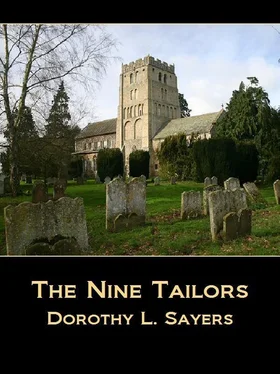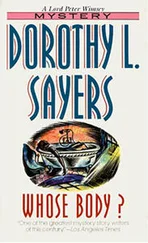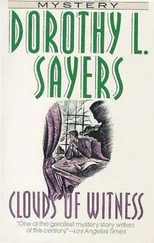Dorothy Sayers - The Nine Tailors
Здесь есть возможность читать онлайн «Dorothy Sayers - The Nine Tailors» весь текст электронной книги совершенно бесплатно (целиком полную версию без сокращений). В некоторых случаях можно слушать аудио, скачать через торрент в формате fb2 и присутствует краткое содержание. Жанр: Классический детектив, на английском языке. Описание произведения, (предисловие) а так же отзывы посетителей доступны на портале библиотеки ЛибКат.
- Название:The Nine Tailors
- Автор:
- Жанр:
- Год:неизвестен
- ISBN:нет данных
- Рейтинг книги:3 / 5. Голосов: 1
-
Избранное:Добавить в избранное
- Отзывы:
-
Ваша оценка:
- 60
- 1
- 2
- 3
- 4
- 5
The Nine Tailors: краткое содержание, описание и аннотация
Предлагаем к чтению аннотацию, описание, краткое содержание или предисловие (зависит от того, что написал сам автор книги «The Nine Tailors»). Если вы не нашли необходимую информацию о книге — напишите в комментариях, мы постараемся отыскать её.
The Nine Tailors — читать онлайн бесплатно полную книгу (весь текст) целиком
Ниже представлен текст книги, разбитый по страницам. Система сохранения места последней прочитанной страницы, позволяет с удобством читать онлайн бесплатно книгу «The Nine Tailors», без необходимости каждый раз заново искать на чём Вы остановились. Поставьте закладку, и сможете в любой момент перейти на страницу, на которой закончили чтение.
Интервал:
Закладка:
Nobody being able to make very much sense out of Mr. Wilderspin’s revelations, the Rector was called, who said that he remembered having seen the man called Stephen Driver on one occasion when he was distributing the parish magazine at the smithy, but that Driver had said nothing then, or at any other time, about bells. The Rector then added his own evidence about finding the body and sending for the police and was dismissed in favour of the sexton.
Mr. Gotobed was very voluble, repeating, with increased circumlocutory detail and reference to what he had said to Dick and Dick to him, the account he had originally given to the police. He then explained that Lady Thorpe’s grave had been dug on the 3rd of January and filled in on the 4th, immediately after the funeral.
“Where do you keep your tools. Harry?”
“In the coke-house, sir.”
“Where’s that?”
“Well, sir, it’s down underneath the church — where Rector says the old cryp used to be. Makes a sight o’ work, that it du, a-carryin’ coke up and down they stairs and through the chancel and sweepin’ up arter it. You can’t ’elp it a-dribbling out o’ the scuttle, do as you like.”
“Is the door kept locked?”
“Oh, yes, sir, always kept locked. It’s the little door under the organ, sir. You can’t get to it without you have the key and the key of the west door as well. That is to say, either the key of the west door or one of the church keys, sir, if you take my meaning. I has the west door key, being ’andiest for me where I live, but either of the others would do as well.”
“Where do you keep these keys?”
“Hanging up in my kitchen, sir.”
“Has anybody else got a key to the coke-house door?”
“Yes, sir; Rector has all the keys.”
“Nobody else?”
“Not as I knows on, sir. Mr. Godfrey hasn’t them all, only the key of the cryp.”
“I see. When these keys are in your kitchen, I suppose any of your family has access to them?”
Well, sir, in a manner of speakin,’ yes, but I ’opes as now you ain’t tryin’ to put anything on me and my missus, nor yet Dick, let alone the children. I been sexton in this — eighty year follerin’ on Hezekiah, and none of us ain’t never yet been suspected of ’ittin’ strangers over the ’ead and buryin’ of them. Come to think of it, this chap Driver came round to my place one morning on a message, and ’ow do I know what he did? Not but what, if he’d a-took the keys I’d be bound to miss them; still, none the more for that…”
“Come, come. Harry! Don’t talk nonsense. You don’t suppose this unfortunate man dug his own grave and buried himself? Don’t waste time.”
(Laughter, and cries of “That’s a good ’un, Harry!”)
“Silence, if you please. Nobody’s accusing you of anything. Have you in fact ever missed the keys at any time?”
“No, sir” (sulkily).
“Or ever noticed that your tools had been disturbed?”
“No, sir.”
“Did you clean them after digging Lady Thorpe’s grave?”
“’Course I cleaned ’em. I always leaves my tools clean.”
“When did you use them next after that?”
This puzzled Mr. Gotobed for a moment. The voice of Dick supplied helpfully: “Massey’s baby.”
(“Don’t prompt the witness, please!”)
“That’s right,” agreed Mr. Gotobed. “Massey’s baby it were, as you can see by the Register. And that ’ud be about a week later — Ah! just about.”
“You found the tools clean and in their right place when you dug the grave for Mrs. Massey’s baby?”
“I ain’t noticed nothing different.”
“Not at any time since?”
“No, sir.”
“Very well. That will do. Constable Priest.”
The constable, taking the oath briskly, informed the court of his having been called to the scene of action, having communicated with Superintendent Blundell, having assisted at the removal of the body and of having helped to search the clothes of the deceased. He then made way for the Superintendent, who corroborated his evidence and produced a brief list of the dead man’s belongings. These were: a suit of navy-blue serge of poor quality, much deteriorated by its burial in the earth, but apparently purchased fairly recently from a well-known firm of cheap outfitters; much-worn vest and pants, bearing (unexpectedly enough) the name of a French manufacturer; a khaki shirt (British army type); a pair of working-man’s boots, nearly new; a cheap spotted tie. In his pockets they had found a white cotton handkerchief; a packet of Woodbines; twenty-five shillings and eightpence in cash; a pocket-comb; a ten-centime piece; and a short length of stiff wire, bent at one end into a hook. The body had worn no overcoat.
The French money and underclothing and the piece of wire were the only objects which seemed to suggest any kind of clue. Ezra Wilderspin was recalled, but could not bring to mind that Driver had ever said anything about France, beyond mentioning that he had served in the War; and the Superintendent, asked whether he thought the wire could be anything in the nature of a pick-lock, shook his head, and said it didn’t look like anything of that sort to him.
The next witness was Dr. Baines, and his evidence produced the only real sensation of the day. He said:
“I have examined the body of deceased and made an autopsy. I should judge the subject to be a man aged between 45 and 50. He appears to have been well-nourished and healthy. Taking into account the nature of the soil, which tends to retard putrefaction, the position of the body when found, that is, about two feet beneath the level of the churchyard and from three to four feet beneath the actual surface of the mound, I should judge the extent of decomposition found to indicate that deceased had been lying in the grave between three and four months. Decay does not proceed so rapidly in a buried body as in one exposed to the air, or in a clothed body as in a naked body. In this case, the internal organs and the soft tissues generally were all quite distinguishable and fairly well preserved. I made a careful examination and could discover no signs of external injury on any part of the body except upon the head, arms, wrists and ankles. The face had apparently been violently battered in with some blunt instrument, which had practically reduced all the anterior — that is, the front — part of the skull to splinters. I was not able to form any exact estimate of the number of blows inflicted, but they must have been numerous and heavy. On opening the abdomen—”
“One moment, Doctor. I take it we may assume that the deceased died in consequence of one or some of these blows upon the skull?”
“No; I do not think that the blows were the cause of death.”
At this point an excited murmur ran round the little hall, and Lord Peter Wimsey was distinctly observed to rub his finger-tips lightly together with a gratified smile.
“Why do you say that, Dr. Baines?”
“Because, to the best of my judgment and belief, all the blows were inflicted after death. The hands also were removed after death, apparently with a short, heavy knife, such as a jack-knife.”
Further sensation; and Lord Peter Wimsey audibly observed: “Splendid!”
Dr. Baines added a number of technical reasons for his opinion, chiefly connected with the absence of any extravasation of blood and the general appearance of the skin; adding, with proper modesty, that he was, of course, not an expert and could only proffer his opinion for what it was worth.
“But why should anybody inflict such savage injuries on a dead body?”
“That,” said the doctor drily, “is outside my province. I am not a specialist in lunacy or neurosis.”
“That is true. Very well, then. In your opinion, what was the cause of death?”
Читать дальшеИнтервал:
Закладка:
Похожие книги на «The Nine Tailors»
Представляем Вашему вниманию похожие книги на «The Nine Tailors» списком для выбора. Мы отобрали схожую по названию и смыслу литературу в надежде предоставить читателям больше вариантов отыскать новые, интересные, ещё непрочитанные произведения.
Обсуждение, отзывы о книге «The Nine Tailors» и просто собственные мнения читателей. Оставьте ваши комментарии, напишите, что Вы думаете о произведении, его смысле или главных героях. Укажите что конкретно понравилось, а что нет, и почему Вы так считаете.












